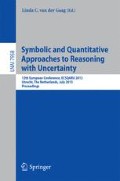Abstract
Consider data given as a sequence of events, where each event has a timestamp and is of a specific type. We introduce a test for detecting marginal independence between events of two given types and for conditional independence when conditioned on one type. The independence test is based on comparing the delays between two successive events of the given types with the delays that would occur in the independent situation. We define a Causal Event Model (CEM) for modeling the event-generating mechanisms. The model is based on the assumption that events are either spontaneous or caused by others and that the causal mechanisms depend on the event type. The causal structure is defined by a directed graph which may contain cycles. Based on the independence test, an algorithm is designed to uncover the causal structure. The results show many similarities with Bayesian network theory, except that the order of events has to be taken into account. Experiments on simulated data show the accuracy of the test and the correctness of the learning algorithm when assumed that the spontaneous events are generated by a Poisson process.
Access this chapter
Tax calculation will be finalised at checkout
Purchases are for personal use only
Preview
Unable to display preview. Download preview PDF.
References
Granger, C.W.J.: Investigating causal relations by econometric models and cross-spectral methods. Econometrica 37(3), 424–438 (1969)
Pearl, J.: Causality: Models, Reasoning, and Inference. Cambridge University Press (2000)
Spirtes, P., Glymour, C., Scheines, R.: Causation, Prediction, and Search, 2nd edn. Springer (1993)
Arroyo-Figueroa, G., Sucar, L.E.: Temporal bayesian network of events for diagnosis and prediction in dynamic domains. Applied Intelligence 23, 77–86 (2005)
Galán, S.F., Díez, F.J.: Networks of probabilistic events in discrete time. Int. J. Approx. Reasoning 30(3), 181–202 (2002)
Patnaik, D., Laxman, S., Ramakrishnan, N.: Inferring dynamic bayesian networks using frequent episode mining. CoRR (2009)
Nikiforov, A.: Algorithm as 288: Exact smirnov two-sample tests for arbitrary distributions. Applied Statistics 43, 265–284 (1994)
Lemeire, J., Meganck, S., Cartella, F., Liu, T.: Conservative independence-based causal structure learning in absence of adjacency faithfulness. Int. J. Approx. Reasoning 53(9), 1305–1325 (2012)
Author information
Authors and Affiliations
Editor information
Editors and Affiliations
Rights and permissions
Copyright information
© 2013 Springer-Verlag Berlin Heidelberg
About this paper
Cite this paper
Lemeire, J., Meganck, S., Zimmermann, A., Dhollander, T. (2013). Detecting Marginal and Conditional Independencies between Events and Learning Their Causal Structure. In: van der Gaag, L.C. (eds) Symbolic and Quantitative Approaches to Reasoning with Uncertainty. ECSQARU 2013. Lecture Notes in Computer Science(), vol 7958. Springer, Berlin, Heidelberg. https://doi.org/10.1007/978-3-642-39091-3_32
Download citation
DOI: https://doi.org/10.1007/978-3-642-39091-3_32
Publisher Name: Springer, Berlin, Heidelberg
Print ISBN: 978-3-642-39090-6
Online ISBN: 978-3-642-39091-3
eBook Packages: Computer ScienceComputer Science (R0)

